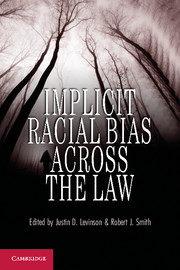Book contents
- Frontmatter
- Contents
- Contributors
- Acknowledgments
- Implicit Racial Bias Across the Law
- Introduction Racial Disparities, Social Science, and the Legal System
- 1 Implicit Racial Bias
- 2 Property Law
- 3 Criminal Law
- 4 Torts
- 5 Employment Law
- 6 Health Law
- 7 Education Law
- 8 Communications Law
- 9 Corporations Law
- 10 Tax Law
- 11 Intellectual Property
- 12 Environmental Law
- 13 Federal Indian Law
- 14 Capital Punishment
- 15 Reparations Law
- Index
- References
9 - Corporations Law
Biased Corporate Decision-Making?
Published online by Cambridge University Press: 05 June 2012
- Frontmatter
- Contents
- Contributors
- Acknowledgments
- Implicit Racial Bias Across the Law
- Introduction Racial Disparities, Social Science, and the Legal System
- 1 Implicit Racial Bias
- 2 Property Law
- 3 Criminal Law
- 4 Torts
- 5 Employment Law
- 6 Health Law
- 7 Education Law
- 8 Communications Law
- 9 Corporations Law
- 10 Tax Law
- 11 Intellectual Property
- 12 Environmental Law
- 13 Federal Indian Law
- 14 Capital Punishment
- 15 Reparations Law
- Index
- References
Summary
Despite the high stakes of today's global economic climate, corporations have not lived up to the challenge of operating in a manner that recognizes their vast impact on people's lives. Instead, they have been accused of making decisions that disregard the welfare of workers, denigrate the environment, and ignore other social responsibilities. Yet what drives corporate decisions that seem to further disadvantage already challenged groups? Is it always a rational pursuit of profit and corporate growth? Or might there be a more nuanced explanation that explains why corporations, for example, hire a particular executive, select an employee benefit plan, build a plant in a certain neighborhood, or donate to a specific charity? Research on implicit bias provides one potential explanation: corporate “persons,” like real people, make decisions in automatically biased ways, often without their awareness. In turn, these decisions adversely affect already disadvantaged groups within society.
Corporate laws have yet to grapple with the problem of implicit bias. This chapter begins an implicit bias based exploration of corporate law in two ways. First, in recognition of the early state of knowledge of implicit bias in corporate decision-making, the chapter proposes that the same empirical methods that have taught scholars about implicit bias in other areas can be implemented to learn more about bias in the corporate law setting. To that end, it presents an empirical study that investigated the following question: If a corporation is truly a legal person, what kind of person is it? Moreover, is it the kind of person particularly likely to discriminate? The chapter then turns to two broader questions that help define the relationship between corporations and implicit bias: First, how might implicit bias infect corporate decision-making in unintentional yet powerful ways, and second, how can the law minimize the continuing harm of implicit bias without straying from needed corporate protections?
- Type
- Chapter
- Information
- Implicit Racial Bias across the Law , pp. 146 - 163Publisher: Cambridge University PressPrint publication year: 2012
References
- 1
- Cited by



